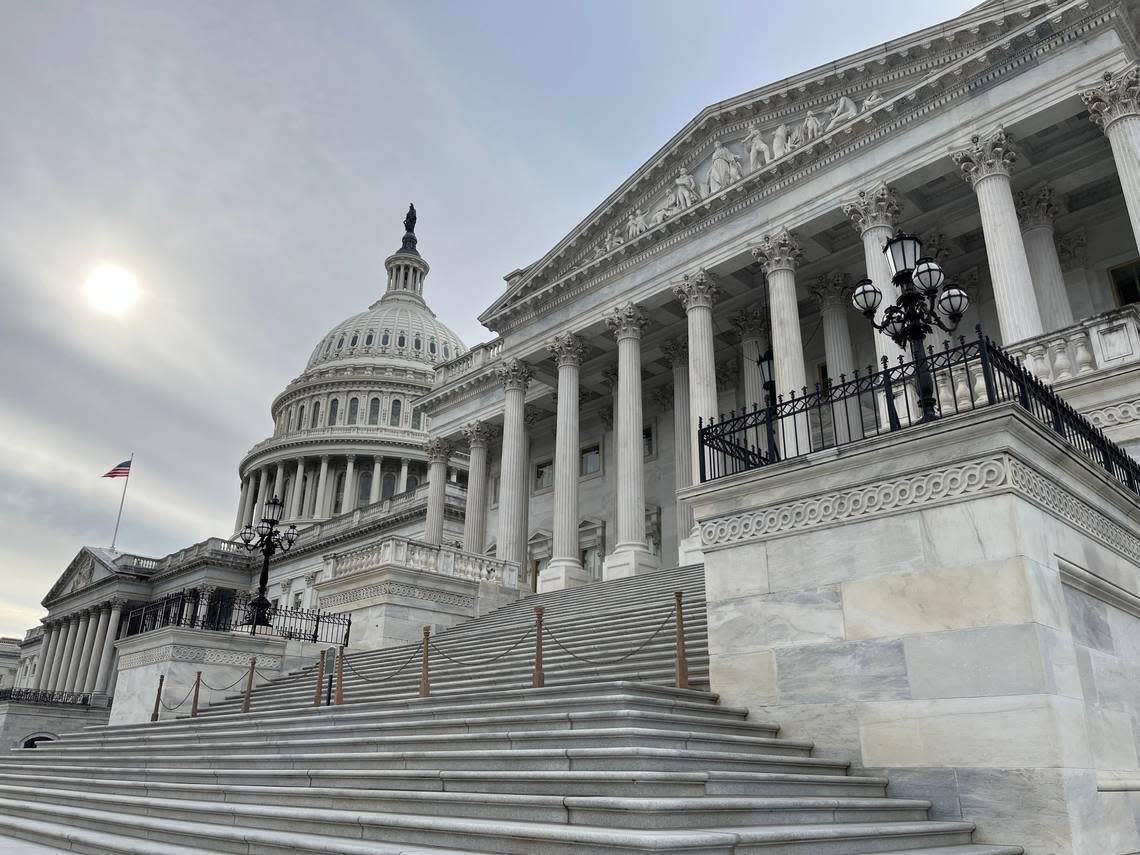‘Shockingly bad’: U.S. Senate Democrats beat up on Missouri-created student loan provider

- Oops!Something went wrong.Please try again later.
- Oops!Something went wrong.Please try again later.
- Oops!Something went wrong.Please try again later.
Missouri’s quasi-governmental student loan agency came under harsh criticism from Democratic senators on Wednesday, as the agency has become pivotal in Republican efforts to block President Joe Biden’s attempts to eliminate student loan debt for millions of Americans.
The hearing came a day after Missouri Attorney General Andrew Bailey launched a lawsuit challenging a Biden administration plan to relieve student loan debt for some Americans, including at least 2,780 Missourians. It hinges on harm done to the quasi-governmental agency, called MOHELA.
The Democratic Senators criticized Bailey and other Republican attorneys general for pushing back against the Biden administration’s attempts to wipe out student loan debt. Kansas City Mayor Quinton Lucas, who testified in front of the committee, said the lawsuits are being filed for political purposes and hurting people who are burdened by thousands in debt.
“There’s nobody in Kansas City, nobody in St. Louis or anywhere in the state who’s been asking [for this],” Lucas said. “And I think what we’re seeing and what we’ve seen today is how many people nationally are impacted. They are looking to get standing to continue to bring these challenges based on the relationship between MOHELA and the state of Missouri, but really the harm extends far beyond it.”
MOHELA’s executive director and CEO, Scott Giles, declined an invitation to appear before the committee. Instead, its defense was left to Scott Buchanon, the executive director of the Student Loan Servicing Alliance.
Buchanan noted that student loan providers have stayed neutral about the Biden administration’s efforts to eliminate student loan debt.
The Senators were focused on two lawsuits. The first, called Biden v. Nebraska, was a suit filed against the Biden administration’s efforts to use powers granted to the executive branch in a state of emergency to wipe out up to $30,000 in debt for millions of Americans.
Missouri joined that lawsuit under former attorney general, and now senator, Eric Schmitt. As it made its way to the Supreme Court, Missouri’s role in the case became essential because it helped give the states the legal grounds to sue over the Biden administration’s plan.
“The Secretary’s plan will cut MOHELA’s revenues, impairing its efforts to aid Missouri college students,” Chief Justice John Roberts wrote in the majority opinion striking down Biden’s plan. “This acknowledged harm to MOHELA in the performance of its public function is necessarily a direct injury to Missouri itself,”
The Biden administration then launched a second effort to forgive student loan debt, which hinges on a series of changes to the student loan program by the Department of Education.
Attorney General Andrew Bailey filed a lawsuit Tuesday challenging one part of that plan, called the SAVE plan, in the U.S. District Court for the Eastern District of Missouri. His lawsuit followed a similar action by Kansas Attorney General Kris Kobach.
But while MOHELA has played a central role in giving the Attorneys General grounds to sue, it hasn’t willingly participated in the suits. In Biden v. Nebraska, Missouri had to file a Sunshine Request to get the documents it needed to make its case.
Sen. Raphael Warnock, a Georgia Democrat, questioned how much the lawsuits help Missourians.
“When I think of all the things that we need attorneys general to be engaged in to protect their constituents, somehow Missouri’s Attorney General wakes up in the morning and thinks this is the great service that the people of Missouri and the people of this country need,” Warnock said.
The Senators – and most of the panel in front of them – were also critical of how MOHELA handles loans.
When student loan payments resumed following a temporary hiatus during the COVID-19 pandemic, MOHELA was late in sending letters to 2.5 million people, according to Persis Yu, the deputy executive director and managing counsel for the Student Borrower Protection Center.
Of those letters, around 280,000 contained inaccurate information about how much money was owed, according to the Student Borrower Protection Center, a nonprofit that advocates for the elimination of student debt.
MOHELA, which is facing two class action lawsuits, has claimed the findings by the Student Borrower Protection Center are false and filed a cease and desist letter.
Buchanan laid the blame for the problems facing borrowers on the feet of the Department of Education, saying much of the trouble comes from confusing orders and a lack of monetary support.
“The department is constantly changing the rules as they go and they don’t give us enough money to do it,” Buchanon told the Star after the hearing. “Then they tell us to cut call center hours because they can’t afford to pay for it, and then we’re surprised that people sit on hold. This is all knowable, this is all predictable.”
Sen. Elizabeth Warren, a Massachusetts Democrat and the chair of the Senate Banking Committee’s subcommittee on Economic Policy, was not convinced. She criticized the MOHELA for being unprepared as Americans began repaying student loans after the COVID-19 pandemic, calling the agency “shockingly bad.”
“MOHELA has repeatedly failed millions of borrowers and it’s time for real action and accountability,” Warren said.
Any federal action may take a while. For much of the hearing, Warren was the only Senator in the room.
She was later joined by four more Democratic senators — Warnock, Sen. Robert Menendez, a New Jersey Democrat plagued by scandal; Sen. Chris Van Hollen, from Maryland; Sen. John Fetterman, from Pennsylvania. No Republicans attended the hearing.
The Department of Education has the ability to rescind MOHELA’s contract as a federal student loan provider, but it recently renewed MOHELA’s contract for another five years.

